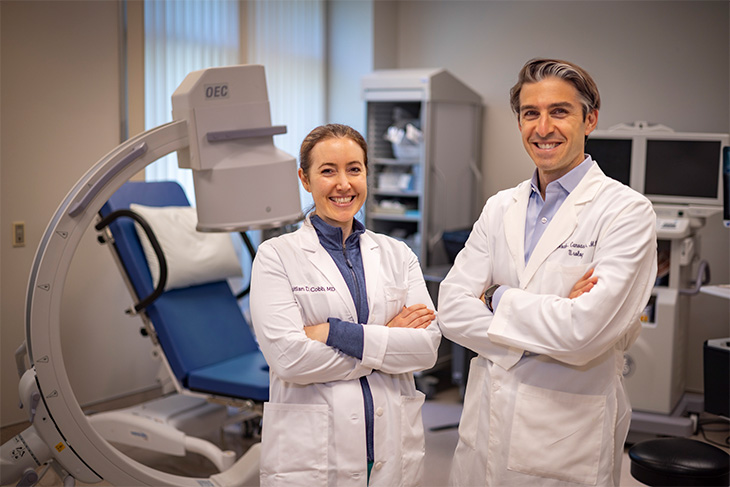More than half a million people go to emergency departments each year because of painful kidney stones. These are hard crystals that form in the kidney and urinary tract. An estimated 1 in 10 people will have a kidney stone at some point in their lives.

UC Davis Health is expanding its capacity to treat complex kidney stone cases with the addition of Kaitlan Cobb, a skilled endourologist with advanced training in kidney stone disease using endoscopic techniques. Cobb joins Noah Canvasser, a endourologist who has been with UC Davis Health since 2017. Canvasser is an associate professor and Cobb is an assistant professor with the UC Davis Health Department of Urologic Surgery.
Cobb joined UC Davis Health earlier this year. In the Q&A below, she shares the latest information about one of the most common, but agonizing conditions Americans face.
What is UC Davis Health's approach to managing kidney stone cases?
Kidney stone disease can be complex and many patients need multiple approaches to their care. We offer a quarterly kidney stone clinic where patients can see a urologist, a nephrologist and a dietitian all during one visit. This creates the best care for our patients by saving them time and coordinating their care. Adult patients are seen in the morning and pediatric patients in the afternoon.
In the adult clinic, the urologist and a dietician specializing in kidney stones see the patients first. Then, if needed, they'll refer the patient to a nephrologist. This is primarily for patients suffering from more than one kidney disease.
How does pediatric kidney stone treatment differ from adult kidney stone treatment?
Thankfully, many pediatric patients do well with our least invasive treatment option — shock wave lithotripsy, which breaks the stones into pieces. In younger patients, kidney stones are closer to the skin, so they are more susceptible to breakage from the externally applied shock waves. When this does not work, or is not feasible, we use many of the same tools as adult kidney stone surgery. However, we do take extra care and focus on the least invasive approach possible.
What makes UC Davis Health unique in its treatment of kidney stones?
There are few multidisciplinary kidney stone centers in the country. In fact, UC Davis Health is the only one in the Sacramento region. We offer more comprehensive care with providers from different specialties. Also, with two full-time endourologists, we are well equipped to handle the large number of kidney stone patients we see from throughout Northern California. This is helping to provide more timely care.
Are kidney stones becoming more common?
We are seeing more kidney stones in patients and there may be many reasons. Certainly, diets play a large role in the increased number of cases. Chronic dehydration, high salt intake, and higher animal protein consumption including beef, chicken and fish all add to the risk of getting kidney stones. In addition, health conditions like metabolic syndrome, diabetes, and gout are all on the rise and they contribute to more kidney stones. There may be genetic conditions playing a role, too.
What is the latest in kidney stone treatment?
For prevention, we prescribe medications to help prevent stones in the most aggressive cases. Surgically, we are seeing some advancements that include the use of suction devices, which are helping to more efficiently remove kidney stones. This can shorten surgery times and improve successful outcomes.
What are the symptoms you should look out for?
Kidney stones typically start to hurt when they cause blockage in the urinary tract, preventing your kidney from draining. That's when you may feel severe pain on either side of your lower back. Other symptoms include:
- Blood in the urine
- Nausea or vomiting
- Constant need to urinate, especially if an infection has already been ruled out
- Chills or a fever if an infection is present (this is when it is important to seek emergency medical care)
What is the best way to prevent kidney stones?
- Drink plenty of water, at least 80 ounces (10 cups) daily
- Reduce salt intake, especially from processed foods
- Limit all sources of animal protein to less than 8 oz per day (beef, chicken, fish, etc.)






